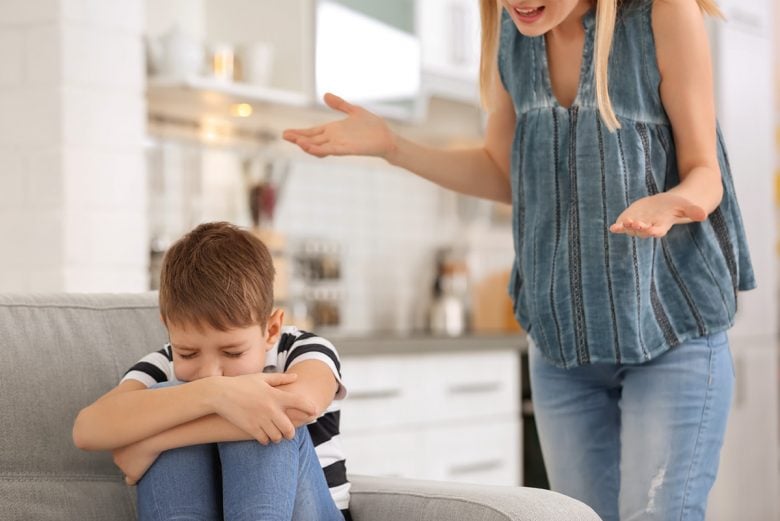
One little phrase can cause more problems than you realize.
“You’re making me worried. You’re making me tired. You’re making me mad. You’re making me crazy. You’re making me angry.” Have you ever said one of those? The phrase “You’re making me…” sets up you and your child for long-term issues.
In this episode, Carol and Anne show why that phrase is so damaging and give you helpful replacements to create even better outcomes.
This episode’s Parenting Practice
Notice the times when you think or say the phrase, “You’re making me…” Using the tips in this episode, change how you say it, to get a more successful response.
Transcript of podcast episode
Anne: It’s not your child’s job to be in charge of your feelings. You feel the way you feel because of your own self.
Carol: Yeah. To say, “You’re making me…” feel any certain way is…
Anne: Yeah. Break that down, “You are making me crazy.” Like, what does that do for a little kid?
Carol: Welcome to “The Child Whisperer Podcast.” I’m your host, Carol Tuttle, author of the best-selling parenting book, The Child Whisperer. I’m with my co-host, Anne Tuttle Brown.
I recently heard a mother talking to her child in an effort to stop the child from doing what they were doing. She said to the child, “You are making me worried.” And if you think about it, that’s a phrase, I think, a lot of parents resort to, especially moms, where they’ll say, “You’re making me worried. You’re making me tired. You’re making me mad. You’re making me crazy. You’re making me angry.” And we want to look at this today and consider, is this really the most supportive thing to say to your child to get the outcome you’re seeking, and what is this setting them up for subconsciously that you really don’t want in the long-term effects of your relationship? Anne, have you ever said any of these statements?
Anne: Of course not. I’m sure I have.
Carol: I’m sure I did, too.
Anne: I have noticed it though and I’ve made corrections. Because there are…like you said, there are other ways to get what you’re seeking than saying this.
Carol: Yeah. This is a phrase that you’re trying to get a correction. So, for example you’re…
Anne: And why is this phrase not a supportive phrase: “You are making me”?
Carol: So, let’s look at it in an actual situation.
Anne: So, you’re outside, your child has maybe a jump rope and they’re swinging the rope really fast above their head, and there are other people in the yard.
Carol: So, they could hit someone with the rope, is the concern, that you’re not aware of what you’re doing and you could cause… The side effect could be someone could get hit with the rope. And so, the parent says, “You’re making me worried. Stop swinging the rope.” The reason it’s not supportive is you’re trying to get the correction so the child will relieve you of how you’re feeling. So, you’re connecting their behavior to how you’re feeling, which then sets up this scenario that your child is responsible for your emotional state of being.
Anne: “I should stop swinging the rope so I don’t make my mom feel worried.” Not, “I should stop swinging the rope because I could hurt somebody.”
Carol: Right. That it’s connected solely to, “I have to change my behavior so I am not stressing my parent.”
Anne: Now, what kind of long-term damages does this create for, as you’ve worked with many adults who are healing from childhood wounding? What kind of responsibility would this put on a child?
Carol: I just launched an entirely new website called The Carol Tuttle Healing Center. And as you know, when we were filming a lot of those clearing and healing sessions, a lot of them were helping adults clear that they were responsible for how their parents felt, that they had to put their parents’ feelings before their own, that they were the reason their parents were stressed or unhappy. And they carry that into their adult life, which creates a codependency tendency that I have to take care of other people because that’s what my parent taught me. Now, it’s a…
Anne: “I make my mom worried. I make others worried. I am a bother. I…” you know, that’s what it translates to.
Carol: Yeah. So, you’re using this probably unknowingly to correct a behavior. You recognize there’s a cause and effect to what your child’s doing and you want them to change their choice.
Anne: And is it fair to say that it’s making you worried?
Carol: Yeah. I think that’s fair. So, you can tell yourself, ”I’m worried,” but it shouldn’t be the catalyst for your child to change.
Anne: Own your own feelings. “I’m worried, how do I correct the behavior?”
Carol: Yeah. You don’t even have to tell your child how you’re feeling necessarily at that point. You just need to recognize, “I’m worried because they may hit someone with that rope. I need to change the course of this. I need to get my child to make a different choice.”
Anne: It’s not your child’s job to be in charge of your feelings. You feel the way you feel because of your own self.
Carol: Yeah. To say, “You’re making me feel any certain way,” is…
Anne: Yeah. Break that down, “You are making me crazy.” Like, what does that do for a little kid?
Carol: I know.
Anne: “I make my mom crazy. I’m too much.” And then…
Carol: I’m a bother. You just need a lot of clearings on this.
Anne: Exactly.
Carol: “I’m a bother. I’m a problem. I’m in charge of my mother’s feelings. I’m in charge of how my dad responds to his world.” That’s a lot of pressure on a child and how effective is it? Did they respond quickly and is it a good remedy? I’m just…
Anne: Probably because they’re scared because their mom says over and over, and over again. And they’re like, “Okay. I don’t want to make my mom worried.” But you’re not teaching the cause and effect of the problem there.
Carol: Right.
Anne: And I think that’s what’s going to serve the more long term is understanding physics when you’re swinging a rope around people, that’s not a good idea. Okay?
Carol: So, what is it…
Anne: You need to stop doing that or go way into the other side of the yard, you know.
Carol: Yeah. Some things you just need to intervene and maybe go get the rope if it’s that high of a risk. If your child is in a risky scenario, you need to intervene physically and redirect them.
Anne: Okay. So, let’s play that scenario out instead of, “Stop it. You’re making me worried.” What do you say?
Carol: “Stop swinging the rope, you might hit somebody.” Say it for what it is, what’s the exact cause and effect here that you’re wanting to change.
Anne: Is it fair to say, “I’m worried right now that you’ll hit someone.”
Carol: I don’t think that’s clear enough. I think it still muddies the…
Anne: So, acknowledge your own feelings for yourself.
Carol: Yeah. I mean, if it’s a persistent thing let’s say, it’s a teenager that’s not coming home on an agreed upon time, there’s risk to where they’re at or who they’re with.
Anne: Or you’re tired of staying up.
Carol: Maybe they have a friend that you’re not real keen on and you’re like, “Oh, you know, what’s gonna happen?” So…
Anne: So, you’re worried, you’re tired because it’s late. You’re probably mad, crazy, and angry, all of the above.
Carol: Right. I don’t necessarily think I’d discuss it at that point and late in the evening. But is it appropriate to sit down with a child that’s older and say, “I feel worried about this. I’m really concerned about it.” That’s healthy. Two adult parents should be sharing each other’s feelings.
Anne: And it’s coming from your perspective, not, “You’re making me worried,” “I’m feeling worried.”
Carol: Yes, you’re owning it.
Anne: This scenario, “This scenario is causing me worry.” Still, in that case don’t throw it out at the child.
Carol: And, “I’m worried about your safety. I’m concerned for your well-being. Maybe I’m just not informed enough and you need to fill me in here. I’m drawing conclusions that aren’t correct.” That’s all appropriate to discuss in a conversation with healthy communication skills. Adults should be talking to each other this way and saying, “Well, this is how I feel and this is what I’m thinking. And I want to know what’s going on for you. How are you feeling about this?” Let them share their feelings then, but as a form of intercepting and trying to change incorrect behavior, it just is unclear. And I honestly just don’t think it’s the most effective approach to change a child’s choices.
Anne: So, this week’s Parenting Practice is notice when you’re using this phrase and change how you say it to get a more successful response.
Carol: Yeah. Like, what is it that you say this to most often? Evaluate…
Anne: And do you have like that one emotion that continues to service for you? Are you always saying, “You’re making me worried, you’re making me worried,” or is it tired?
Carol: The other important takeaway in this is what you focus on, you create more of, your energy flows to what you keep repeating. You give attention to it, it expands, it creates what you don’t want. So, if you’re always saying, “You’re making me this,” and it’s not a positive thing, what if you were saying, “You’re making me so happy.” I don’t even think that’s necessarily healthy to say a child’s in charge of making you anything. Just say, “That behavior, I really love the choices you’re making. I’m very happy about that. I’m happy with how…our relationship. I’m happy because of this.”
Anne: “I love seeing make good choices. I love seeing you be so kind to your brothers.”
Carol: Drop the “making me” and again, if you keep putting your attention on the negative, you’re inviting more of that to show up. You’re creating a pattern of, “I’m going to attract more things to be worried about in my life.”
Anne: Go throughout the day, start telling, “How many of these negatives worry, tired, mad, crazy, angry, are you saying to yourself, to your children throughout the day?” Okay. Well, that’s an opportunity to switch that, to notice what’s driving that. Maeke some changes and notice how can you make improvements, how can you start more positive self-talk, and create more of what you want. Just by those little phrases, I think, go a long way because if you’re constantly saying, “You’re making me worried,” then you’re gonna be in a constant state of worry.
Carol: And it’s not getting you what you really want. The reason you’re even saying it is not an effective approach as a communication intervention. Thanks for listening. For more support, go to thechildwhisperer.com where you can purchase the book, subscribe to our weekly parenting practice e-mail, and find a transcription and audio of “The Child Whisperer Podcast.”
Anne: If you’re listening on iTunes, thank you for leaving your review. If you have a parenting question, please send it to [email protected].



